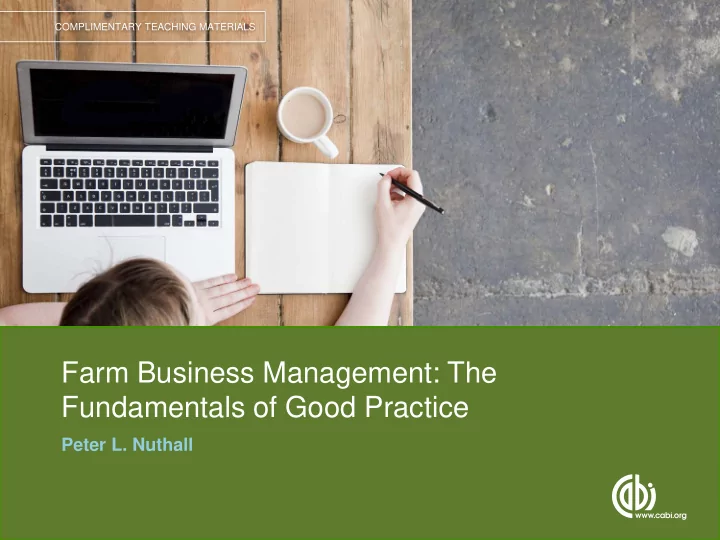

COMPLIMENTARY TEACHING MATERIALS Farm Business Management: The Fundamentals of Good Practice Peter L. Nuthall
Chapter 10 Observation Skills COMPLIMENTARY TEACHING MATERIALS
LEARNING OBJECTIVES Actively consider the different classes of information needed in effectively managing a farm. Appreciate the need for developing a range of observation processes and associated yardsticks. Learn about the basic farm reports necessary in critiquing a farm and its management. Discover the steps in successful visual and reading observation. Realize the importance of assessing a farmer’s objectives, and how this might be achieved. Learn about how to improve memory capacity as a tool in better management. Understand what is meant by a ‘decision problem’ and how they are recognized. Discover how to be an active listener. COMPLIMENTARY TEACHING MATERIALS
Background to Observation Decisions require comprehensive and accurate facts and knowledge. Facts and knowledge come from observation. Successful observation requires work and practice. Observation needed to know and understand the following: • biological factors on the farm and beyond; physical factors on the farm and beyond; • • markets for outputs and inputs; • institutional factors impinging on the farm; • the financial situation; • opportunities; current situation on the farm and related factors. • COMPLIMENTARY TEACHING MATERIALS
Skills for Observation in General Sharp faculties: see, hear, smell, read – all comprehensively. Storage in long-term memory, and appropriate retrieval. Information interpretation skills: significance and relevance. Critical view of information: question and conclude efficacy. Accurate recording where appropriate. COMPLIMENTARY TEACHING MATERIALS
Basic Processes Prepare, and keep up to date, a report on the physical features of a farm (the property report). For example, land utilization and soil types, fencing type and conditions, buildings and conditions, machinery types and conditions, stock numbers and details, rainfall and climate information. Prepare, and keep up to date, a report on the management systems used (the management report). For example, cultivation procedures, fertilizer policies and timing, financing systems, labour management, stock feeding policies and procedures, pasture management. Keeping reports up to date requires regular farm inspections. COMPLIMENTARY TEACHING MATERIALS
Visual Observation Process: quick scan and re-scan of surroundings, return to notable features, interpret, review and make conclusions. Use: sight, smell and hearing. COMPLIMENTARY TEACHING MATERIALS
Reading Skills Active and effective reading involves PQR3: Preview: quick scan. Question: what is relevant? Read, recite and review. Critical thinking: an essential component of all observation. Critically assess ALL that you learn: is it true and relevant? Junk science: be aware that much information is simply untrue; the purveyor will have a range of objectives (e.g. sell something…. ); assess, decide and maybe discard. COMPLIMENTARY TEACHING MATERIALS
Objectives, Goals and Observation Skills Observe and clarify objectives: this is an essential requirement in making decisions because they provide the yardsticks. To assess the general form of objectives, use questionnaires and/or observe the farm and family. Specific objectives: need to convert general objectives into specific actions. Priorities: list the actions for the current year in priority order. Time available for actions: where does it all go? Keep records and re-plan. Family consultations: family is an integral part of objectives and goals. Flexibility: constantly review as feelings, prospects and outcomes change. COMPLIMENTARY TEACHING MATERIALS
Memory and Good Management Observation also involves storing and retrieving information, particularly using the brain. The better the memory, the easier good management. Memory can be improved: practice and good techniques improve brain power. Process: observations go into short-term memory; information is processed and then sent to long-term memory if it is considered relevant. Improvement processes: writing down, repetition, visual image, remarkable features, talking and sharing with others. COMPLIMENTARY TEACHING MATERIALS
Problem Definition: Another Part of Observation Management success depends on recognizing and defining ‘problems’. Problems must be carefully defined: what is their nature, boundaries? Isolate from observations (thus regular farm reviews) situations needing decisions and action. Consider relevance of each: maintain a critical view. Consider options and conclude. Action follows. COMPLIMENTARY TEACHING MATERIALS
Listening Skills Listening is the main source of information: get it right. Good listening involves energy and concentration. Two situations: public lectures, radio broadcasts and the like, and conversations with involvement. Public listening: concentration, keep an open mind, review, resist distractions. Active listening: concentration, encouraging comments but no interruptions, give summaries and feed back conclusions for verification. Remove biases: block preconceptions, get the message, and use your eyes (visual nonverbal messages) to assist. Understand the process involved in changing ideas, knowledge and beliefs: takes time and thought. COMPLIMENTARY TEACHING MATERIALS
Thank You Name: First Surname Email: email@email.com COMPLIMENTARY TEACHING MATERIALS
Recommend
More recommend